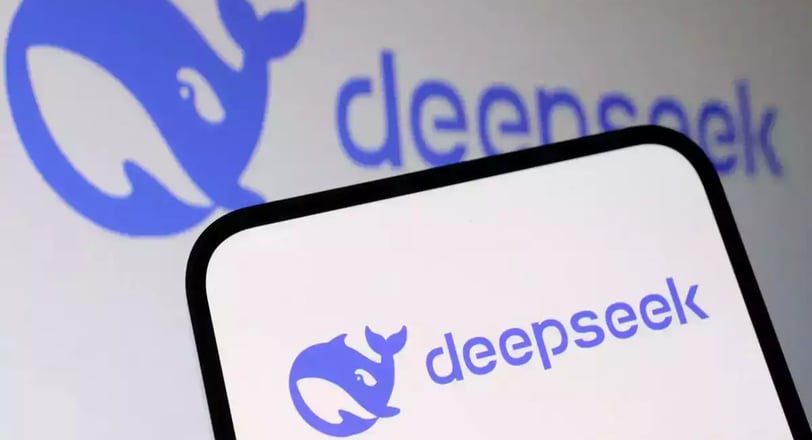Add your promotional text...
DeepSeek's Ascent: The AI Revolution and India's Battle for Data Sovereignty
Synopsis: The rapid rise of DeepSeek, a cost-efficient artificial intelligence platform, has sparked both excitement and controversy worldwide. With its ability to disrupt the AI landscape, the platform’s Chinese origins and data policies have drawn scrutiny from Indian authorities, raising questions about national security, data protection, and regulatory oversight.
VIEWS ON NEWS
By Monika Agarwal
1/28/20253 min read


A Revolutionary AI Platform with a Controversial Core
The tech world has been abuzz with DeepSeek's meteoric rise. Developed at a fraction of the cost of leading AI models such as ChatGPT, the platform has gained massive traction since its launch. But as with many breakthroughs, DeepSeek's success comes with significant concerns, especially for India, where data security and sovereignty are paramount.
At its core, DeepSeek's competitive edge lies in its minimal development costs—just $6 million compared to the billions invested by global AI giants. This affordability, coupled with a seamless user experience, has made DeepSeek an instant favorite. However, its privacy policy has alarmed governments worldwide, including India.
Data Localization and Sovereignty in the Spotlight
DeepSeek’s privacy policy states that the data it collects is stored on secure servers located in the People's Republic of China. This revelation has sparked a debate about data sovereignty, particularly in India, where past decisions to ban apps like TikTok and PUBG were rooted in concerns over Chinese data storage practices.
Experts argue that allowing DeepSeek to operate in India could undermine the country’s data localization mandates and compromise national security. Saswati Soumya Sahu, an expert in data protection and AI, notes, “The question of whether platforms like DeepSeek should be allowed to serve Indian users depends entirely on the government’s stance on cross-border data flows and its commitment to data sovereignty.”
Regulatory Challenges and the Legal Vacuum
Indian regulators face a unique challenge: there’s limited legal precedent for enforcing data protection rules on AI platforms like DeepSeek. Courts are yet to interpret the applicability of Indian data protection laws to AI platforms, as evidenced by the ongoing OpenAI vs ANI case in the Delhi High Court.
In the interim, regulatory clarity is needed to address platforms hosting sensitive data outside of India. Legal experts like Lalu John Philip, founder of Boolean Legal, suggest that Rule 14 of the draft Digital Personal Data Protection Rules, 2025, could strengthen the government’s ability to restrict platforms that fail to comply with localization norms.
DeepSeek’s Impact on AI and National Security
Beyond data sovereignty, the platform’s outputs have also raised eyebrows. Reports of factually incorrect or misleading responses, including contentious claims about Indian states, have fueled distrust among Indian users. This isn’t the first time an AI model has faced scrutiny—Google's AI platform, Gemini, was previously criticized for similar inaccuracies.
Given these concerns, many believe a cautious approach is warranted. “The government must establish strict norms for data localization and ensure the protection of national sovereignty before allowing platforms like DeepSeek to operate in India,” warns Nazneen Ichhaporia, Partner at ANB Legal.
A History of App Bans in India
India’s history of restricting foreign platforms with ties to China offers insights into how the government might respond to DeepSeek. Past examples include:
TikTok Ban: Cited for storing sensitive Indian user data in China.
PUBG Ban: Implemented for similar reasons.
Huawei and ZTE Restrictions: Barred from participating in critical infrastructure projects due to national security concerns.
Given this precedent, DeepSeek could face similar scrutiny, particularly if its data storage practices fail to align with Indian regulatory requirements.
The Way Forward: A Calibrated Response
While DeepSeek is still in its early stages, experts urge the Indian government to adopt a measured approach. This includes:
Regulatory Advisory Notes: Issuing clear guidelines on data localization for platforms like DeepSeek.
Stronger Legal Frameworks: Finalizing and implementing data protection rules that address cross-border data flows.
Vigilance on AI Outputs: Monitoring AI-generated content for accuracy and adherence to national standards.
As Saswati Soumya Sahu aptly puts it, “India’s response to DeepSeek must strike a balance between fostering innovation and safeguarding national interests.”
Balancing Progress and Protection
DeepSeek’s ascent highlights the transformative potential of artificial intelligence but also underscores the risks of unregulated innovation. India’s stance on the platform will serve as a litmus test for its commitment to data sovereignty and security in the age of AI.
By establishing robust localization norms and enhancing regulatory oversight, India can ensure that platforms like DeepSeek contribute to its digital ecosystem without compromising its sovereignty. The decisions made now will shape the nation’s AI landscape for years to come.
Stay tuned as we closely follow this unfolding story and its implications for India’s tech policy and global AI dominance.
